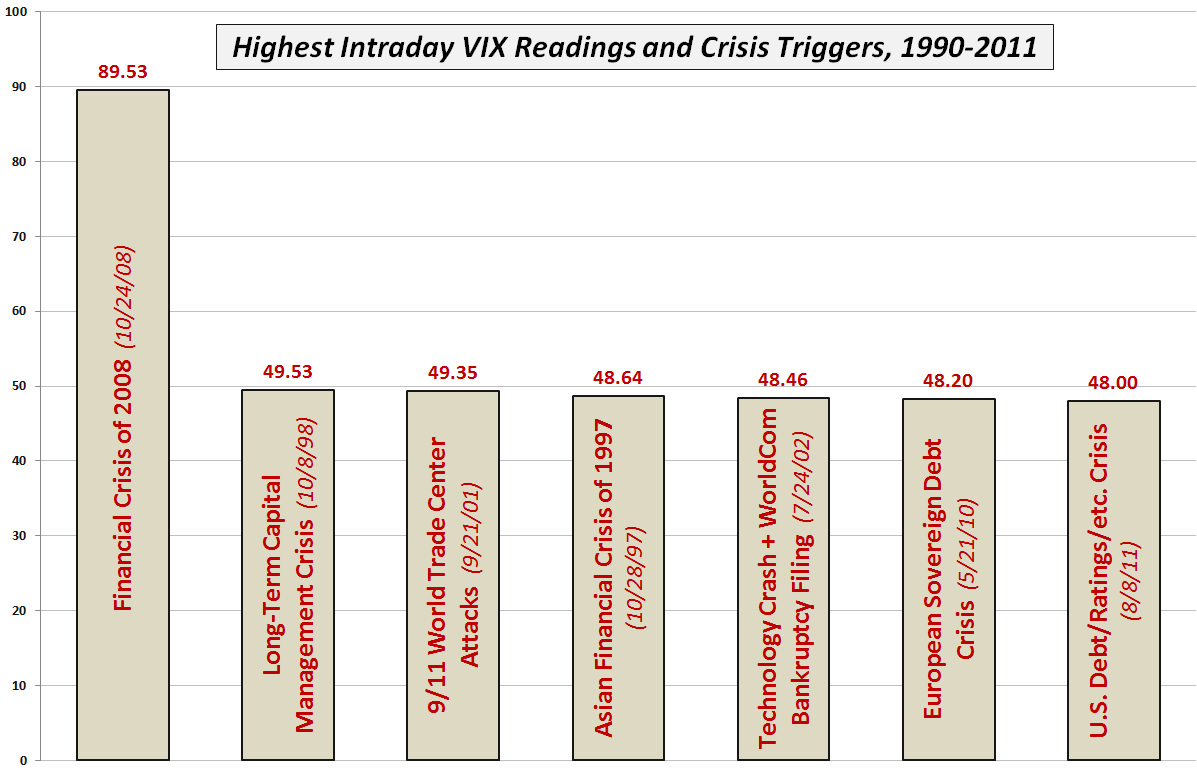by Bill Luby
Just a week ago the VIX seemed to be lagging behind the growing investor anxiety about fundamental challenges facing the stock market, but after Thursday’s drop of 4.78% in the S&P 500 index and today’s decline of 6.66%, the doubling of the VIX to 48.00 in one week seems right in line with investor fear. [Those wondering what a VIX of 48 means should consider that the literal translation is a prediction of a 3% or more change in SPX at least once every three days. See Rule of 16 and VIX of 40 for a more detailed discussion.]
As the chart below shows, a VIX of 48 only puts the current crisis at #7 all-time – or at least dating back through VIX data since 1990. On a closing basis, today’s close was actually the highest closing VIX outside of the 2008-2009 financial crisis.
In studying my VIX data set, however, I was surprised to see that today the VIX set a number of new records. For instance, today marks the highest the VIX has ever closed relative to its 10-day, 20-day and 50-day simple moving averages. All three of these facts loom extremely large in terms of predicting future mean reversion behavior. In fact, I publish a proprietary VIX Mean Reversion Index each Wednesday for the benefit of my newsletter subscribers and today marks the first time that index has maxed out at 100.
I also have my own proprietary calculations for VIX fair value. Today my model puts VIX fair value in the mid-37s, which confirms what the VIX Mean Reversion Index is saying.
Of course the VIX is certainly capable of continuing to defy gravity for an extended period going forward, but the odds favor a top in volatility very soon and quite possibly at 48.00. Just in the time it took to create this post the Dow Jones Industrial Average futures have swung several hundred points, so it is unrealistic to expect volatility to come to a screeching halt.
Better yet, fasten your seatbelts tomorrow, but don’t be afraid to short volatility.
Related posts:
As the chart below shows, a VIX of 48 only puts the current crisis at #7 all-time – or at least dating back through VIX data since 1990. On a closing basis, today’s close was actually the highest closing VIX outside of the 2008-2009 financial crisis.
In studying my VIX data set, however, I was surprised to see that today the VIX set a number of new records. For instance, today marks the highest the VIX has ever closed relative to its 10-day, 20-day and 50-day simple moving averages. All three of these facts loom extremely large in terms of predicting future mean reversion behavior. In fact, I publish a proprietary VIX Mean Reversion Index each Wednesday for the benefit of my newsletter subscribers and today marks the first time that index has maxed out at 100.
I also have my own proprietary calculations for VIX fair value. Today my model puts VIX fair value in the mid-37s, which confirms what the VIX Mean Reversion Index is saying.
Of course the VIX is certainly capable of continuing to defy gravity for an extended period going forward, but the odds favor a top in volatility very soon and quite possibly at 48.00. Just in the time it took to create this post the Dow Jones Industrial Average futures have swung several hundred points, so it is unrealistic to expect volatility to come to a screeching halt.
Better yet, fasten your seatbelts tomorrow, but don’t be afraid to short volatility.
Related posts:
- Highest Intraday VIX Readings
- Rule of 16 and VIX of 40
- VIX Approaches Pre-2008 Record Highs
- VXO Chart from 1987-1988 and Explanation of VIX vs. VXO
- Volatility History Lesson: 1987
- Chart of the Week: VXV and Systemic Failure
- Forces Acting on the VIX

See the original article >>
No comments:
Post a Comment